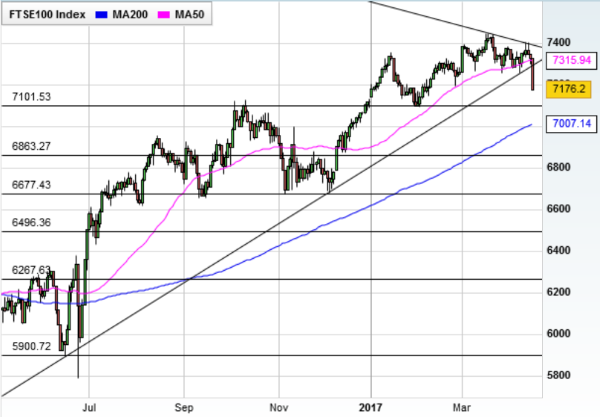UK election shock smashes FTSE 100
18th April 2017 13:35
by Lee Wild from interactive investor
Share on
While most of us were visiting family, the local garden centre, or getting away from it all, seems Prime Minister Theresa May spent Easter in high-level strategy meetings with cabinet colleagues. The upshot is a snap general election on 8 June, which is already being billed as a second referendum on Brexit.
It's not quite how May is selling it. She's miffed at opposition threats to derail the process and believes the best way to silence the critics is to get a clear mandate for Brexit, her way.
"It was with reluctance that I decided the country needs this election," she said late morning Tuesday, "but it is with strong conviction that I say it is necessary to secure the strong and stable leadership the country needs to see us through Brexit and beyond."
"If we do not hold a general election now their political game-playing will continue, and the negotiations with the European Union will reach their most difficult stage in the run-up to the next scheduled election."
That's the explanation for a major U-turn on her promise after last July's Tory leadership victory that she will not go to the polls until 2020.
Assuming she gets the two-thirds majority of the House of Commons needed to circumvent the Fixed-Term Parliaments Act, an election win in June would give May the mandate she needs to keep her Brexit plan on track over two difficult years of talks with EU negotiators.
But there is risk here, too. Yes, Jeremy Corbyn is one of Britain's most unpopular political leaders of all-time, and two polls in recent days put the Conservatives 21 points ahead of Labour. Pollsters think May could command the largest majority since Thatcher in the afternath of the Falklands war, but, in an era of shock election results, few would completely rule out another.
It will be no help to May, either, if she fails to get that mandate. A significant margin of victory will be a huge vote of confidence for May and certainly increase the chance of a "soft" Brexit – better news for the pound. A narrow win will do little good.

And it is this risk that's got equity markets jittery. After slightly disappointing Chinese housing data had already whacked iron ore prices, toppling miners like , and , the election news only hastened the 's decline Tuesday.
Between 11:15 and 14:15, the blue chip index fell a further 60 points, taking the day's losses to 150 points, or 2%. At 7,175, the FTSE 100 has not traded this low since early February.
Remember, too, the inverse correlation between the leading index - packed full of businesses earning a crust in strong overseas currency - and sterling. The pound goes up, the FTSE 100 goes down. It's a trend established following last summer's Brexit vote, and today is no different.
Having traded as low as $1.2515 Tuesday, sterling is currently up at $1.2740, a four-month high. A rush to cover short positions probably exaggerated the move, but traders clearly believe a mandate for May's Brexit strategy can only be good for a country now committed to leaving the EU, and that the Remainer PM might take a "softer" approach to Brexit.
In terms of what this means for equities, our technical analyst Alistair Strang this morning pointed to a "shocking" 7,115 as a likely end-point of any short-term downward move. Given the initial reaction, that looks perfectly plausible. Further out, however, equities remain among the best plays in town, and this just made them cheaper.
This article is for information and discussion purposes only and does not form a recommendation to invest or otherwise. The value of an investment may fall. The investments referred to in this article may not be suitable for all investors, and if in doubt, an investor should seek advice from a qualified investment adviser.